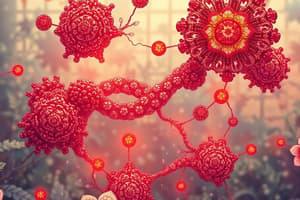Podcast
Questions and Answers
What role do enzymes play in a given reaction?
What role do enzymes play in a given reaction?
Enzymes lower the activation energy for reactions.
What are some facts about enzymes?
What are some facts about enzymes?
Enzymes tightly control the chemistry of living cells because they have the ability to lower the activation barriers for specific reactions.
How do enzymes lower activation energy?
How do enzymes lower activation energy?
An enzyme binds tightly to one or more molecules and holds them in a precise configuration that lowers the activation energy.
What are the molecules that enzymes act upon?
What are the molecules that enzymes act upon?
Are enzymes changed by the reaction?
Are enzymes changed by the reaction?
What is the definition of a catalyst?
What is the definition of a catalyst?
What are substrates?
What are substrates?
Are enzymes changed by the reaction?
Are enzymes changed by the reaction?
What is a catalyst?
What is a catalyst?
How does an enzyme increase the rate of a reaction?
How does an enzyme increase the rate of a reaction?
What is used to break covalent bonds?
What is used to break covalent bonds?
Flashcards are hidden until you start studying
Study Notes
Enzyme Function
- Enzymes lower the activation energy, facilitating chemical reactions within living organisms.
- They are crucial for controlling cellular chemistry by reducing activation barriers in specific reactions.
Activation Energy
- Enzymes bind to substrates and hold them in a specific arrangement, which decreases the activation energy required for the reaction to proceed.
- The precise configuration provided by enzymes helps in catalyzing reactions more efficiently.
Substrates
- Substrates are the molecules that enzymes target and act upon during the catalysis process.
Catalyst Characteristics
- A catalyst is defined as a molecule or substance that reduces the activation energy of a chemical reaction.
- Enzymes function as catalysts but remain unchanged after the reaction, allowing them to catalyze the same reaction multiple times.
Reaction Rate
- Enzymes significantly increase the rate of reactions by lowering the activation energy barrier.
- They can enhance reaction rates by factors as high as 10^14.
Covalent Bonds
- Enzymes are instrumental in breaking covalent bonds during the reaction process, showcasing their essential role in biochemical transformations.
Studying That Suits You
Use AI to generate personalized quizzes and flashcards to suit your learning preferences.





